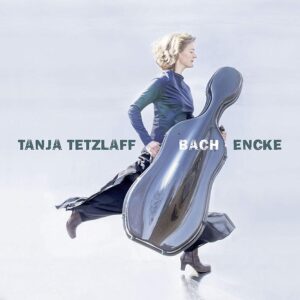Not yet another recording of the Bach Cello Suites? It feels like everyone tall enough to hold a cello must also record them. The problem isn’t more choice, which itself is always a good thing, but recordings that bring nothing new—much less better—to the table. The consumer’s choice doesn’t thereby actually increase meaningfully, but the market becomes glutted and confusing. Well, Tanja, of the supremely musical Tetzlaff-household, would not just dump her Bach Suites on us without a twist. And indeed she presents the latter three suites interspersed with two custom-composed works by Thorsten Encke: “Cracks” and “Clouds” for cello solo and tape, written for Tetzlaff, and ice-skating inspired (the liner notes elucidate somewhat) in 2018.
This kind of combination raises the question whether mutual or hierarchical enhancement is the goal. The former works like a great red wine paired with a good steak or sage-porcini risotto (for our vegetarian readers): They bring out the best in each other. The latter concept is more like whiskey-and-cigar: One (the whisky) enhances the other (the cigar), albeit at its own expense. With Bach/Encke we have the latter situation. Encke is the whisky; he admits as much himself. His interludes are meant to clean the palate, change the perspective, ready the ears in a certain way for Bach. The aim is laudable, the result is more questionable.
As for the Bach: It starts auspiciously enough with the nicely over-enunciated Prelude of the E-flat major Suite BWV 1010, well-recorded, resonant, deep-toned, not unlike Wolfgang Boettcher’s recording (Nimbus) and not quite as overwhelmingly booming as Heinrich Schiff’s (EMI). All three suites are fluidly played, totally sound, more perfect than imaginative, and stylistically monolithic. Moving to the C minor Suite, Tetzlaff sounds a bit determined and thin-lipped (Prelude), a bit same-ish eventually, but also offering much welcome lightness in the Gavotte and a reasonably spry account of the Gigue. Only the Sarabande of the D major suite is dragged out to unengaging, numbing effect.
If this sounds like a fairly terrific, if perhaps not literally outstanding, recording of these three suites, there are two caveats. First: The two contemporary inclusions don’t work as intended and are of dubious merit on their own account. On tape we get noises (gurgling, white noise, echo, rain-sticks, someone manhandling the microphone, Arne Nordheim-style electronic icicle-plink-plonk) wedded to pre-recorded abrasive cello sounds. To this, the live cello plays along with expectant humming, droning, col legno tapping, and occasional squeaking. Except for a brief moment of ethereal coming-together of these sounds in “Clouds”, there’s probably not much more to be extracted from them. Altogether the two pieces last for less than 10 percent of the music on this disc—too much to disturb and too little to truly influence the Bach (or work on its own). Encke-lovers will want more of it, Bach-lovers less. And while I don’t know about the former, the latter have a vast amount of great recordings of all six suites to choose from (see our references below).
































